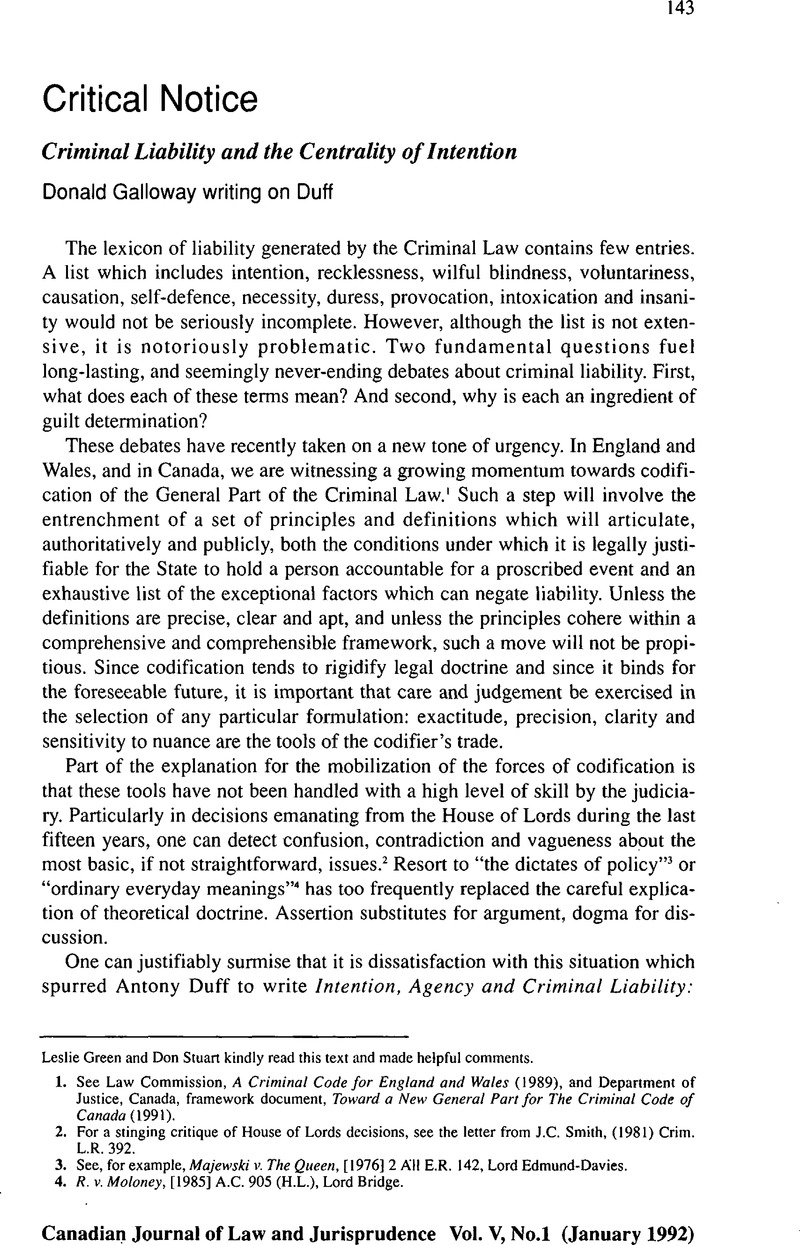No CrossRef data available.
Published online by Cambridge University Press: 09 June 2015

Leslie Green and Don Stuart kindly read this text and made helpful comments.
1. See Law Commission, A Criminal Code for England and Wales (1989), (and Department of Justice, Canada, framework document, Toward a New General Part for The Criminal Code of Canada (1991).Google ScholarPubMed
2. For a stinging critique of House of Lords decisions, see the letter from Smith, J.C. (1981) Crim. L.R. 392.Google Scholar
3. See, for example, Majewski v. The Queen, [1976] 2 All E.R. 142, Lord Edmund-Davies.
4. ft. v. Moloney, [1985] A.C. 905 (H.L.), Lord Bridge.
5. Antony Duff, Intention, Agency and Criminal Liability: Philosophy of Action and the Criminal Law (Oxford: Blackwell, 1990) Google Scholar[ISBN 0-631-15311-X $44.95 or ISBN 0-631-15312-8 (pbk.) $15.95]
6. These labels are in fact deceptive. The distinction which Duff draws has little to do with the importance of consequences. It is a distinction between a model which strictly separates issues of wrongdoing and culpability, by defining wrongdoing solely in terms of causing harm, and a model which melds them. Nevertheless, I retain Duff’s terminology in the following discussion.
7. For example, he states that a specific intent offence “typically requires not merely the intentional commission of the actus reus, but its commission with a specified further intention”(40). He then goes on to note that murder, a recognized specific intent offence, does not fit this model.
8. In explaining intent in terms of the agent’s beliefs in the possibility of success, Duff makes a minor error. While it may be accurate to say that a person who believes that he will not achieve a result does not intend that result, this does not entail that a person who intends a result must believe that there is a chance of achieving it. A person can have no opinion about what the chances of success are. A person may intend a result while not knowing one way or the other whether it is possible. If a person sets out to swim Lake Ontario, he is intending to do so even if he does not know whether he has the capacity to succeed. Duff's requirement that intention, in this narrow sense, assumes a belief in a chance of success is too rigorous. The mere absence of a negative belief would suffice.
9. Once again there is a minor inaccuracy in Duff’s contention. If an unskilled dartplayer believes that he has skill, then it would be apt to describe him as aiming for the triple twenty. It is not the actual existence of skill which counts but the self perception of the agent. Moreover, as was noted above, the person who does not know whether he has a skill, may still bring a result about with intent to do so.
10. See ArthurDanto, C. “Basic Actions” in Alan, R. White, ed., The Philosophy of Action (Oxford: Oxford University Press, 1968) 43.Google Scholar
11. Ibid. at 51.
12. [1960] S.C.R. 871 at 877.
13. [1988] S.C.R. 833 at 863.
14. Though it has been previously identified in Criminal Law theory. SeeHart, H.L.A. Punishment and Responsibility (Oxford: Clarendon Press, 1968).Google Scholar
15. It is unfortunate that Duff does not develop his idea of an attack more fully. As Duff notes, a person may suffer similar harms when attacked by a human or when the unlucky victim of a natural disaster. However, a person may also be attacked by a dog. Duff’s analysis of attacks as embracing human attitudes does not seem to leave open this possibility. The example of a dog attack casts doubt on the idea that we define something as an attack by taking account of the human attitude which motivates it.
16. Duff recognizes that it would be inappropriate to define negligence solely in terms of failure to meet an objective standard. He correctly notes that a negligence based standard should still make inquiries into the agent’s capacity to meet the standard.
17. This is not an insignificant problem. Duff does not give a detailed account of choosing, and therefore leaves us with no grounds on which to base the distinction.
18. The distinction between ‘choosing not to’, and ‘not choosing to’ is the critical factor here also. See supra, note 16.